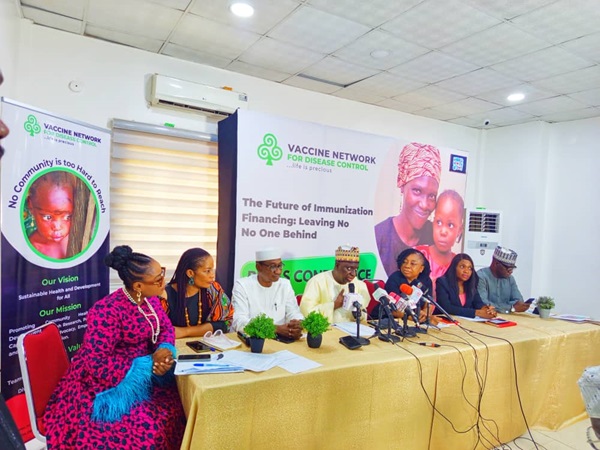
Health stakeholders and public health advocates have issued an urgent call for the immediate release of vaccine funds, alongside a significant increase in budgetary allocations, to keep pace with Nigeria’s rapidly growing population.
They also pressed for bold and decisive steps towards local vaccine production, stressing that such measures are crucial for strengthening the country’s immunisation systems and ensuring national health security.
The call came during a high-level immunization financing press conference held on Monday in Abuja, organized by the Vaccine Network for Disease Control (VNDC), in collaboration with the Global Health Advocacy Incubator (GHAI).
Science Nigeria reports that the event, which drew attention from across the public health spectrum, was held under the theme ‘Future of Immunization Financing: Leaving No One Behind’.
Participants at the event lamented the chronic inadequacy and unpredictability of vaccine funding, warning that the lives of millions of Nigerian children hang in the balance.
Speaking at the conference, chairman of the National Health Insurance Authority (NHIA), Senator Ibrahim Yahaya Oloriegbe emphasised the critical nature of vaccine financing. “Vaccine funding must be like sunlight – available when needed,” he declared emphatically.
Oloriegbe, who previously served as chairman of the Senate Committee on Health during the 9th Assembly, painted a vivid picture of the vaccine delivery pipeline. He explained the chain from national procurement processes, through donor support, state-level distribution and down to local government health facilities.
He pointed out that maintaining the cold chain – a system for storing and transporting vaccines at recommended temperatures – is vital. “Without proper storage and temperature control, vaccines lose their efficacy,” he warned.
Oloriegbe noted that while states and local government areas (LGAs) are expected to manage last-mile logistics, significant gaps remain. “That’s where civil society and development partners step in. But ideally, this should be a government-led process,” he added.
Reiterating the need for predictable funding, he stressed, “A child born today cannot wait for the next quarter’s capital release. Vaccine financing must be reliable, consistent and timely – just like sunlight.”
A former member of the House of Representatives from Kaduna State in the 8th National Assembly, Hon. Mohammed Usman voiced similar frustrations. “Funding is inadequate; we must increase it as our population grows,” he asserted.
Expressing concern over persistent delays, Usman said, “It’s April 2025 and money for 2024 vaccines has still not been released. This is deeply troubling. Are we truly serious about protecting our children? With Nigeria’s population exceeding 230 million and growing daily, vaccine funding must increase accordingly.”
He urged President Bola Tinubu to align his Renewed Hope Agenda with concrete action. “Timely release of funds for vaccines must be non-negotiable. The President must lead by example,” he emphasised, noting that Health Minister Prof. Muhammad Pate, with his extensive community health experience, is well-positioned to champion this cause.
Usman further highlighted the critical role of local governments, especially as Nigeria advances toward financial autonomy at the grassroots level. “Every tier – federal, state and local – has a role to play. Local governments, in particular, must demonstrate readiness to fulfill their responsibilities,” he said.
He passionately advocated for reviving Nigeria’s domestic vaccine production capacity, recalling the nation’s achievements in the 1970s when it produced its vaccines locally. “If we had sustained that effort, we wouldn’t be dependent today. Instead, we’d be exporting vaccines to other African countries,” he lamented.
Calling for substantial investment, Usman argued, “What is ₦10 billion compared to what Nigerians spend on luxuries that add no real value? We need ₦50 to ₦100 billion dedicated to vaccine production. Without it, we’ll continue to rely on imports.”
He reminded all attendees that the responsibility for progress lies with everyone. “We all have a role to play. Funds for vaccines must not only be approved but disbursed promptly, where they are needed and through proper channels.”
In her remarks, executive director of the Vaccine Network for Disease Control (VNDC), Chika Offor reflected on recent progress in vaccine financing, highlighting a breakthrough achieved in December 2024.
“In December 2023, the future of vaccine financing in Nigeria seemed bleak. Despite sustained advocacy under the Partnership to Reach Zero-Dose Children (PREACH) initiative, funds for 2022 and 2023 vaccines remained unreleased,” she recalled.
“However, by December 2024, we witnessed a breakthrough: the Federal Government released the outstanding funds and allocated 25% of the 2024 vaccine budget,” she announced with optimism.
Offor commended President Tinubu, Health Minister Prof. Pate and Finance Minister Wale Edun for their commitment to immunization and vaccine financing. “The 2025 budget’s allocation of ₦231.7 billion for immunization, malaria vaccination and vaccine tracking marks a significant milestone toward universal vaccine coverage,” she noted.
However, she also warned of looming threats. “With the exit of USAID funding and declining donor support, Nigeria’s vaccine financing is more vulnerable than ever. Shrinking fiscal space and competing national priorities jeopardise immunization programmes. If we do not act swiftly, we risk reversing the hard-won gains of 2024,” she cautioned.
She closed her remarks with a rallying call to action. “This is an urgent call for coordinated action from all stakeholders. We urge President Tinubu to instruct the Ministry of Budget and National Planning to establish a predictable and sustainable immunisation financing framework. Vaccine financing is not merely a health priority – it is a smart economic investment that saves lives and reduces long-term healthcare costs.”
Executive director of Gem Hub Initiative and co-convener of the Joint Learning Agenda for UHC in Nigeria, Oyeyemi Pitan lauded the unwavering dedication of stakeholders committed to protecting Nigeria’s children through strengthened immunisation systems.
Science Nigeria further reports that, according to the World Health Organisation (WHO), immunisation remains one of the most effective strategies for safeguarding children’s health globally. Yet, achieving universal vaccination coverage continues to be an uphill battle. In low- and middle-income countries, more than 12.4 million children remained unvaccinated in 2020. These vulnerable children, referred to as “zero-dose children,” represent a significant portion of those at greatest risk.


